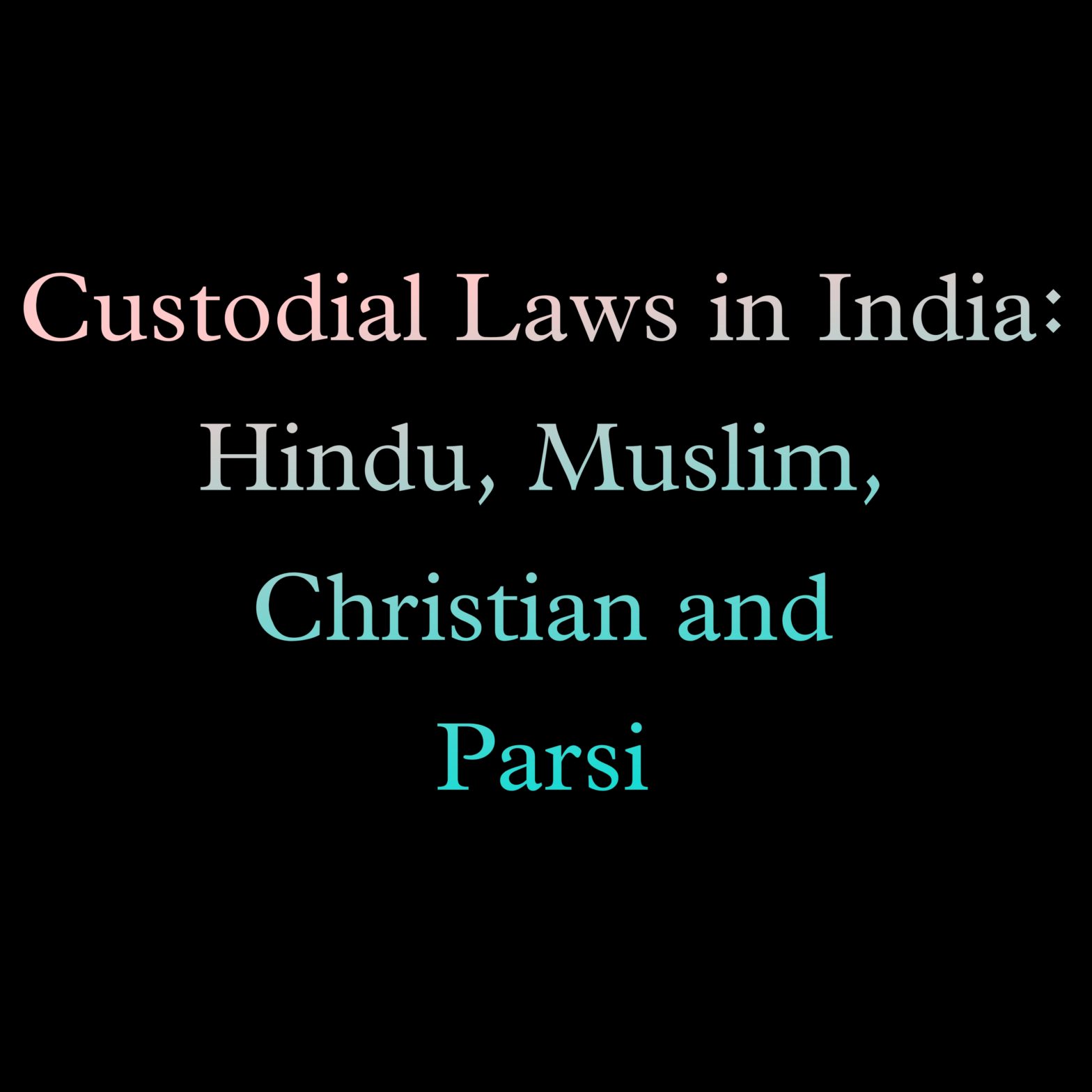It is the child who suffers the most if a marriage breaks down or ends up separated. In this article, we will be talking about different laws applicable to the custody of children of different religions.
Introduction

Custody of a child refers to the right given to a parent by the court to look after the minor child. If a child is a minor, the legal right to look after him/her is called child custody. The question of ‘child custody’ arises during divorce or judicial separation procedures, and it becomes a crucial matter for the courts to resolve. The custodial parent has primary responsibility for the kid’s education, development, medical, emotional, and physical well-being, while the non-custodial parent has merely the right to access and meet the child. Custodial laws while keeping in mind the parents’ right to the custody of a child, hold the welfare of the child as the most important factor of consideration when deciding upon who gets the custody of a minor child.
Factors contributing to the welfare of the child:
- The proper ethical upbringing of the child in question.
- Assurance of safety of the child.
- Safekeeping of the child
- The economic well-being of the guardian
Forms of Child Custody
The family court in India when vesting custody rights resorts to any of the four forms listed below:
Physical custody
When physical custody is awarded to a parent, the child will be under the guardianship of that parent. However, the other parent can also meet the children from time to time with due permission. The motive behind this form of custody is to ensure that the child gets all the benefits of family and has the best upbringing possible.
Joint custody
Under joint custody, both the parents will take care of the child turn by turn keeping the child in their custody. The grant of joint custody rights ensures that both parents play a significant part in the growth of the child’s life. The environment around the child is made fulfilling and enriching while trying to not deprive the child of affection of both the parents during his formative years.
Sole custody
Under sole custody, the custody of the child relies on one biological parent. A parent with “sole custody” of a child can get exclusive physical and legal custody rights concerning the child. This custody is usually awarded in rare cases, when there is a history of abusive behavior, or are incapable of being beneficial to the child in some fashion.
Third-party custody
Under third-party custody, the custodial rights lie with neither of the biological parents. Third-party custody means a non-parent who is seeking custody of a child. Third-party custody is awarded in the cases where the court deems that both the parents are incapable of raising a child and to let anyone of them have the rights of the child would not be beneficial for the child.
Who can claim custody of a child?
The custody of a child can be primarily claimed by either the mother or the father. In case either of the two is deceased or not in the picture because of operation of any other law, the maternal and paternal grandparents, any other relative(s) of either of the parents strictly out of compassion towards the child can seek custody of the child. The Court can also appoint a third person to be the guardian of the child.
Determination of the priority of claim of custody

The Hon’ble Supreme Court and other courts in India have reiterated time and again that in the proceedings for custody of a minor, the welfare of the minor is the only consideration, irrespective of the claims of the parties to the custody. During the process of determining the decision of whom to vest the custodial rights of the child, the child’s views are also taken into consideration if the child is above nine years.
Step-mother vs custody of a child
The Mother of a minor cannot be discarded as the guardian just because she earns less than the father. The father has to provide for the child’s maintenance in such a case as it is a well-established principle of law that a step-mother has a primary obligation of affection towards her children and the father would be at work all day, and hence, the mother would be the better guardian for the welfare of the minor child.
Custodial rights under various Personal laws

allindianlegalupdates.blogspot.com
Hindu law
The marriage and the subsequent separation laws are dealt with by the personal Hindu Laws. The Hindu Minority and Guardianship Act, 1956, the Hindu Marriage Act, 1955, and the Special Marriage Act, 1954 mentions the rules and regulations for the transfer of custodial rights of a minor after separation:
Section 26 of the Hindu Marriage Act, 1955
Section 26 of the Hindu Marriage Act, 1955 deals with the education and the maintenance of the child only when both the parents are of the Hindu religion. Under this act, the court can pass orders, judgements, amendments, etc. concerning the maintenance of the child and dispose of the pending decree within 60 days from the date of service of notice.
Section 38 of the Special Marriage Act, 1954
Section 38 of the Special Marriage Act, 1954 deals with the custody of the child in the case both the parents belong to different religions or have undertaken a court marriage. Under this law, the orders can be passed at any juncture of time, overriding the pending decree within 60 days from the date of service of notice.
Hindu Minority and Guardianship Act, 1956
Hindu Minority and Guardianship Act, 1956 allows only biological parents to seek custody of their minor child provided that he/she is a Hindu.
Muslim law
The custody of a Muslim minor child is dealt with by the personal law and the Guardians and Wards Acts, 1890. In the case of any conflict, the Guardians and Wards Acts, 1890 prevails. Under Shia law, a mother’s right to the custody of her minor children extends until a son is two years old, and the daughter attains the age of seven. However, under Sunni law, custody of a child is with the mother till he attains the age of 7 in case of a boy; and till she attains puberty in case of a girl. The mother’s right of custody continues even if she is divorced but in case of remarriage after the divorce process in India, the custody belongs to the father. The consent of the child is taken into consideration if he is held to be able to understand his interests. Further, such consent has to be cross-checked to identify there’s no element of tutoring present. In case there is, the consent of a child has to be disregarded.
Christain law
The issue of custody of a Christian child is dealt with by the Indian Divorce Act, 1869 with Guardians and Wards Act, 1890. The Act provides that in the case of religions that do not have personal laws for child custody, the decisions would be enforced by the courts under the powers allotted by Section 41-43 of the Act. The child’s welfare plays a vital role as the parents have to prove themselves capable of the responsibility of rearing the child. The court may deny custody in case it is not satisfied with the abilities of the parents.
Parsi law
The custody of a child under Parsi law is dealt with by the provisions of the Guardians and Wards Act, 1890. Its main aim is the welfare of the child and can put anything to stake to make sure that the welfare of the child is confirmed.
Landmark Judgements
RV Srinath Prasad vs Nandamuri Jayakrishna & Ors, 2001.
In this case, the Supreme Court held that custody of minor children is a sensitive issue and therefore, the custody orders by their nature can never be final. However, before a change is made, it must be proved to be of paramount interest to the children. In a sensitive matter like this, no single factor can be taken to be decisive. Neither affluence nor capacity to provide comfortable living should be the consideration of the court.
Mousmi Moitra Ganguli vs Jayant Ganguli, 2008
In this case, the court held that it is the welfare and interest of the child and not the rights of the parents which was the determining factor for deciding the question of custody. The court further held that the question of the welfare of the child had to be considered in the context of the facts of each case and decided cases on the issue may not be appropriate to be considered as binding precedents.
Keshav R Thakur and Anr vs Suchhibai, 2005
In this case, the Supreme Court awarded custody of a boy aged 16 to the grandparents over the mother as the child had been living with his grandparents since the age of six.
Premchand Jinrajsa Sahuji vs Surendra, 2005
In this case, the Supreme Court before deciding the issue of custody of the girl child-directed the High Court to appoint a child psychiatrist to consider the adverse psychological impact on the child if the custody of the child was given to the father from the relatives of the dead mother.
Gaytri Bajaj vs Jiten Bhalla, 2012
In this case, the Court held that the wishes of children are of prime importance in determining custody. An attempt was made by the Court, even through personal interaction with the children, to bring the issue of custody and visitation rights to a satisfactory conclusion.
Conclusion
The welfare of the child is considered the paramount importance in a proceeding for the custody of a minor. The laws relating to child custody are evolving now and they have adopted the uniform practice of keeping the child’s best interest in mind. The custody of the child depends upon the personal laws read with the Guardians and Wards Act, 1890. The final decision regarding the custody of the child is taken by the court. The welfare of the child had to be considered in the context of the facts of each case and decided cases on the issue may not be appropriate to be considered as binding precedents.
Frequently Asked Questions (FAQs)
What is to be done when neither parent of a child is ready to take up child custody in India after divorce?
Interested persons can file a petition before the court to give custody under Guardian and Wards Act, who can be the grandparents, relatives or appointed by the court.
What is the difference between sole and shared custody?
Sole custody means that the child lives with only one parent. Shared legal custody means that both parties have equal input and the right to determine, jointly, all aspects relating to the legal custody of the child.
Who will get the custody of a minor if the mother is in a weaker financial condition as compared to the father but the father has remarried and has kids?
Only the welfare of the child is looked into after looking into all the facts of the case.
What are the different factors of a parent that determines the custody of a child?
Few factors that determine the custody of a child are as follows:
- The Child’s Preference.
- The Quality of the Child’s Relationship Between His or Her Parents. T
- the Mental and Physical Health of the Parents.
- The Wishes of the Parents.
- Work Obligations of Both Parents.
What is the difference between Guardianship and Custody of a child?
Custody describes a parent’s care of a child, whereas legal guardianship is granted to someone who is not the child’s biological parent. In some situations, a child may be under the guardianship of an individual while remaining in the custody of their parents to a degree.
How can a father win a child custody case?
When it comes to custody, the father might obtain it in the following ways:
- If the mother agrees to relinquish custody of the child, the father may be granted custody.
- If the mother is unable to care for the kid, the child will be given to the father.
- If the kid is 13 years old or older and shows a desire to live with his father, the court will give it to him.
- If the mother has a bad reputation, which might harm the kid, the father is given custody.
- If the father can demonstrate the mother’s financial incapacity, which will have an impact on the kid’s upbringing in the future, as well as his financial ability to care for the child.
- If the father can show that the mother’s history is shady and that the kid’s upbringing or mental and physical development would be jeopardized if the child stays with her, the child’s rearing will be jeopardized.
- If the mother is a convicted felon, the child’s custody will be given to the father.
